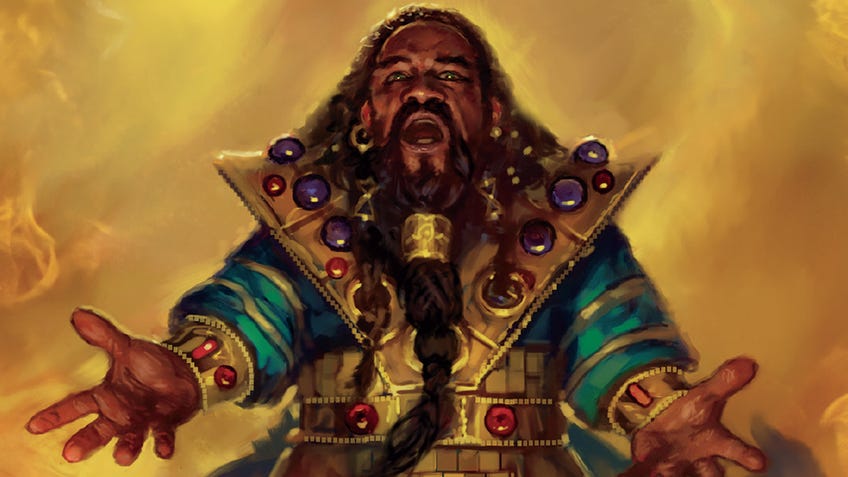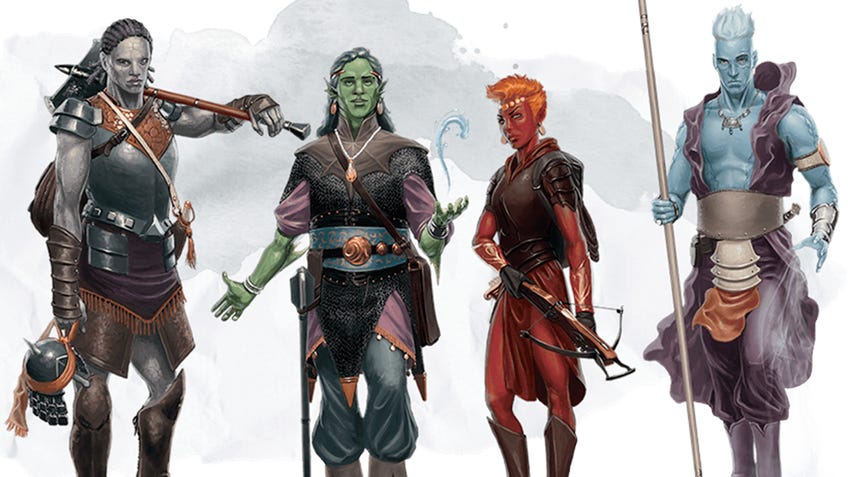Dungeons & Dragons latest playtest rolls back Bardic Inspiration and more to 5E rules, adds two subclasses and ability tweaks
Based on player feedback.
The most recent playtest update released on Unearthed Arcana, the website containing preview materials for Dungeons & Dragons players, features multiple instances of backtracking to rules found in the current Fifth Edition.
Released late last week, the Player’s Handbook Playtest 6 is a substantial document containing the most recent changes that Wizards of the Coast, the publisher responsible for releasing the tabletop roleplaying game, is testing out with players for the next upcoming edition of D&D.
Many of the changes included in the Player’s Handbook Playtest 6 appear to be reverting rules back to their Fifth Edition versions, with some updates directly referencing player feedback. A total of seven classes are included in the most recent playtest update, with the specific changes between updates being highlighted in each individual section.

A change that has been universally applied to all seven classes featured in this playtest is that the number of spells you can prepare is no longer tied to the level of spell slots their character has access to. This means that any spells a player’s class has access to can be cast, regardless of the level of spell slots their character has, as long as they have been prepared – which opens up a lot of potential for spellcasting classes. This was apparently a widely requested change featured in player feedback.
Another universal change is that the level progression for each of the subclasses featured within this latest update have been altered to match progression in the 2014 D&D Player’s Handbook, which will reportedly ensure that the subclasses contained in the upcoming edition will be compatible with any existing 5E subclasses.
Every class included in the Player’s Handbook Playtest 6 has seen its previously assigned Epic Boon feature being replaced by a more specific feature, such as the bard’s Words of Creation or the cleric’s Greater Divine Intervention. It appears that epic boons will still be making a return in a future edition of Unearthed Arcana, but not as part of any class level progression.
The largest change to the bard class is that Bardic Inspiration – the most important feature for a bard - has been reverted back to its 5E iteration. Instead of requiring players to guess whether or not they’ve failed a d20 test to use their inspiration die, players can use it to improve a known failure. What’s more, is that anyone gifted with a Bardic Inspiration die has an entire hour to use it, rather than just 10 minutes. Players can also no longer use a Bardic Inspiration die to heal, as Wizards found that players hoarded the die for the right moment to heal, rather than using it sooner.
Players with a bard character will be able to choose whether they use the arcane, divine or primal spell list, allowing them to customise what flavour of spellcasting their bards favour.
A new subclass for the bard has been featured in the Player’s Handbook Playtest 6 called the College of Dance. As the name suggests, this subclass is themed around bards expressing their power through dancing, rather than song or words. Such highlights of the subclass include Dazzling Footwork, which is unlocked at third level, that allows bards to choose between one of three different benefits, sixth level’s Tandem Footwork - which enables bards to help boost their allies’ initiatives – and Irresistible Dance, a 14th level ability that allows the player to always be able to cast Otto’s Irresistible Dance.

The cleric class has seen their iconic Channel Divinity feature be returned to second level, rather than unlocking it at first level, with its number of uses increasing in relation to the character’s level, rather than their proficiency bonus. Clerics will also gain an additional use whether they finish a short rest.
Both Divine Intervention and Greater Divine Intervention have been redesigned in response to player feedback, with the aim being to provide a more reliable way to receive a response from a cleric’s deity. Whereas the previous version had players rolling a percentile dice, with the goal of rolling equal to or lower than their cleric level, the new version has players just casting a divine spell of fifth level or lower to perform the feature.
Druids have seen a huge change in this latest playtest update. A previous Unearthed Arcana update saw Wild Shape – the druid’s most recognisable ability, which allows them to morph into different creatures – being reworked to have druid characters unlock different types of transformations at specific levels, rather than using the beast stat blocks.
However, this new update has removed Channel Nature - an ability that enabled druids to use Wild Shape, amongst other things – and altered the way Wild Shape works to have players unlock it at second level, with three known forms that they can change into, with the options being limited to creatures up to a challenge rating of 1/4 who cannot fly. Wild Shape is now a bonus action and swimming creatures are available from second level.
A new subclass for the druid class has been featured in the Player’s Handbook Playtest 6 called Circle of the Sea, which revolves around utilising waterways and oceans. Highlights of this new subclass include a collection of circle spells focused around water – such as fog cloud and control water – as well as aquatic affinity, which means players always have the Water Breathing spell prepared and Stormborn, which grants the player the ability to fly and resistances to certain types of damage.
The monk class is seeing a few minor changes including the martial arts ability starting with a d6 instead of just a d4 – but only for unarmed strikes – with the max die of this ability being a d12, instead of just a d10, which is apparently to give the monk the chance to keep up with its fellow classes. Monks now learn weapon mastery, which grants players to opportunity to pic from a variety of master properties for simple weapons.

With the latest playtest for the fantasy RPG, paladins can now change one prepared spell after having a long rest and can no longer cast cantrips – with the weapon mastery feature replacing this. Paladins can also use their lay on hands ability as a bonus action, with Divine Smite, now called Paladin’s Smite, granting access to a list of paladin-exclusive smite spells that the player will also have prepared.
Both the monk and the paladin’s innate resistance to disease have been removed in response to the fact that disease has seemingly not had a “solid meaning” in years, with the effects of disease coming from the poisoned condition – with the playtest using the condition for that purpose now.
Whilst the changes to the ranger class are fairly small – with some alterations to existing abilities and a few new ones – the rogue class is seeing a little more in the Player’s Handbook Playtest 6.
Sneak Attack, possibly one of the rogue’s most iconic abilities, does not need to be used specifically with the attack action on a rogue’s turn – thereby giving it a bit more flexibility.
Subtle Strikes has since been replaced with a third level feature called Steady Aim, which comes from 5E sourcebook Tasha’s Cauldron of Everything and whose inclusion was reportedly requested by a lot of playtesters. Steady Aim enables players to gain advantage on their next attack as long as they haven’t moved yet this turn. A new fifth level feature called Cunning Strike gives rogues several conditions and options to augment their Sneak Attack with, making it an even deadlier ability, with Devious Strikes – a new 14th level feature – augmenting sneak attack even further.
Players can download the Player’s Handbook Playtest 6 from the Unearthed Arcana section of the D&D Beyond website right now, with the core rulebooks for the next edition of Dungeons & Dragons coming in 2024.











